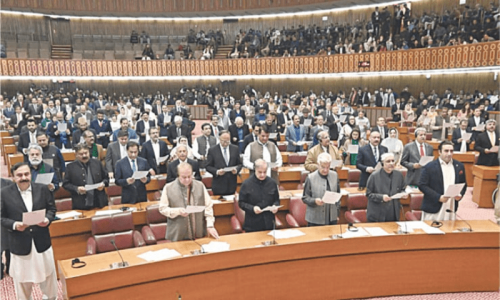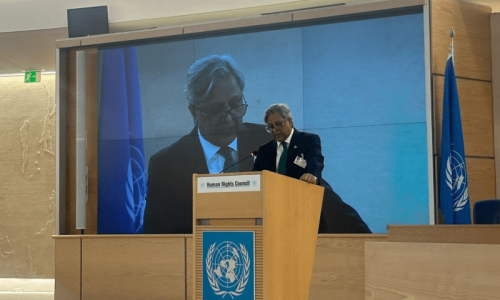
ISLAMABAD: The Ministry of Finance has finalised the broad contours of the federal budget of 2012-13, envisaging tax revenue of Rs2.34 trillion, federal government’s expenditure of about Rs2.74 trillion and fiscal deficit of about Rs1.125 trillion.
A senior official told Dawn on Wednesday that consultations were in progress to convene a meeting of the Council of Common Interests (CCI), probably in the last week of the current month, at which the budget outline would be handed over to provincial chief ministers and finance ministers to plan their budget proposals accordingly.
He said the focus of fiscal management next year would be on strengthening provincial budgets because the provinces had failed to meet their commitment of providing about 1 per cent of cash surplus during the current financial year. He said despite political compulsions ahead of elections, the government would continue to work on austerity measures and improve resource mobilisation.
Meetings of annual plan coordination committee and national economic council are also being scheduled to work out federal and provincial development programmes. Since the role of provincial governments in fiscal discipline and revenue measures has been enhanced under the g, the CCI has assumed an important role in planning.
According to the budget strategy paper, the tax revenue target of Rs2.34 trillion has been worked out on the basis of current year’s target of Rs1.952 trillion, current year’s inflation of about 12 per cent and GDP growth rate of about 4.2 per cent for the next year, coupled with improvements in tax policy and administrative reforms.
As such, the revenue target has been raised by about 20 per cent because the government believes that current year’s target of Rs1.952 trillion will be achieved. As a result, revenue collection is estimated to touch 9.7 per cent of GDP next year compared with 9.3 per cent this year.
The non-tax revenues are estimated at about Rs550 billion, slightly lower than current year’s estimate of Rs560 billion. Therefore, revenue (tax and non-tax) has been estimated at Rs3.033 trillion, or about 12.5 per cent of GDP, compared with current year’s target of Rs2.6 trillion, showing an increase of about 17 per cent. This includes Rs140 billion earnings from various surcharges.
Of the total revenue, the provincial and federal shares have been estimated at Rs1.42 trillion and Rs1.6 trillion, respectively.
The consolidated expenditure (federal and provincial) has initially been estimated at about Rs3.8 trillion, showing an increase of about 8.6 per cent over the current year’s estimate of Rs3.5 trillion.
The federal government’s expenditure has been estimated at about Rs2.74 trillion, including an allocation of Rs545 billion for defence (up 10 per cent), Rs240 billion for pensions (up 10 per cent) and Rs120 billion for power subsidies (up 140 per cent). The public sector development programme of the federal government has initially been estimated at Rs350 billion, showing an increase of about 17 per cent.
The total interest payments have been estimated at Rs935 billion. While projecting the fiscal deficit at Rs1.125 trillion or 4.2 per cent of GDP, the government has estimated the total size of the public debt at about 56 per cent of GDP, lower than during the current year.
The initial estimate also suggests that the government was expecting about $13 billion remittances from overseas Pakistanis but given a wide gap between imports and exports, the current account deficit has been put at about $4 billion. The trade deficit has been estimated at about $15.2 billion with exports and imports at $26.5 billion and $42 billion, respectively.
The official said that energy shortages and public sector losses which hampered an economic turnaround during the current year would continue to remain major challenges in the next financial year and, therefore, the management of public finances would remain a major policy priority.















































